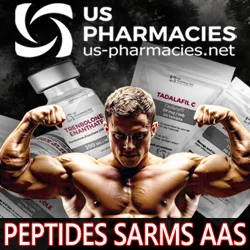Muscle Insider
New member

Trenbolone for Health?
By William Llewellyn
A study in the journal Steroids suggested that trenbolone might have applications for improving cardiovascular disease risk factors.
There is not much argument about it. Trenbolone is the heavyweight of injectable anabolic-androgenic steroids (AAS). Of course, testosterone is still more popular. But trenbolone is a more potent anabolic steroid. It is one of the best muscle builders, and most juicers know it. As a result, it is in demand, and the labs are cashing in.
But don’t run out and look for trenbolone just yet. It is also generally regarded as one of the most toxic injectables. It is prone to causing side effects like disturbed HDL/LDL cholesterol, elevated blood pressure, acne, hair loss, increased aggression … the basic issues you find with any strong androgen. This drug isn’t even approved for human use in the West these days; I always assumed due to such properties. Therefore, I was quite interested to read a study in the journal Steroids, which suggested that trenbolone might have applications for improving cardiovascular disease risk factors.1 What!? Let’s take a look.
First, the study I’m referring to used rats for the experiments. A total of 12 animals “participated,” and were divided into two groups. Half were implanted with osmotic infusion pumps delivering cyclodextrin vehicle (control). The other half had pumps giving them 2 milligrams per kilogram per day of trenbolone. This went on for six weeks. At the end of the six weeks, some striking changes were noticed in lab reports of the trenbolone-treated animals. Not necessarily for the worse. These animals lost fat mass (37%), gained lean mass (11%) and had notable improvements in serum triglycerides, LDL cholesterol, HDL/LDL cholesterol ratio and insulin sensitivity. Benign prostatic hyperplasia was also noticed in the treated animals, so it was not all positive. Still, this did point to remarkable changes in body composition and resulting improvements in risk factors – that might offer benefits well after the drugs are discontinued. We would need to see more follow-up, of course.
Is there some real health value here? Perhaps there is. Trenbolone is a very strong anabolic steroid. It surely does carry health risks when abused for bodybuilding purposes. This is just obvious at this point. However, that doesn’t necessarily exclude its potential for therapeutic use. Consider this. Many men are suffering or beginning to suffer the ills of age, sedentary lifestyle and resulting poor metabolism (obesity, insulin resistance, systemic inflammation). A big issue here is believed to be the loss of lean muscle mass. If a drug like trenbolone could alter body composition drastically and for the better in a short period of time for such patients, why couldn’t there be some value? Perhaps there are better lean body mass-supporting AAS therapies than testosterone to be found.
The main issue with this study, obviously, is that it was only one, and it was conducted on rats. This is common, of course. All drugs get tested on animals first, and rats provide very good models for testing the effects of drugs that may someday be given to people. Still, the fact remains that trenbolone was not yet shown to have such favorable properties in actual human test subjects. This study may point to very tangible value here; hopefully an area where more research will be conducted in the future. For now, it is just too early to say, and trenbolone is definitely too strong to recommend for HRT (hormone replacement therapy) or sarcopenia (age-related wasting).
Taurine as Ancillary Agent?
Here is another really interesting (but also very early) paper about steroids and health.2 It involves the common amino acid taurine. In the study it discusses, a selection of male rats was taken and divided into groups. These groups were control (no treatment), nandrolone decanoate (100 mg/kg/week), taurine (100 mg/kg/day) and nandrolone decanoate plus taurine. This went on for eight weeks. At the end of the study, there were surprising differences between the steroid-taking animals, favoring taurine. In particular, the rats given AAS plus taurine did not notice the same disturbances in sex steroids as the steroid-only group. These animals maintained normal testosterone levels and sperm quality. The researchers attributed the benefits of taurine to it having antioxidant, anti-inflammatory and anti-apoptotic (preserving cell life) effects. While it is very early to make any judgments, taurine is a very natural and fairly non-controversial amino acid supplement. Perhaps it is worth adding some into your next program if you take AAS, just to see?
William Llewellyn is widely regarded as one of the world’s foremost authorities on the use of performance-enhancing substances. He is the author of the bestselling anabolic steroid reference guide ANABOLICS and CEO of Molecular Nutrition. William is an accomplished researcher/developer in the field of anabolic substances, and is also a longtime advocate for harm reduction and legislative change. He built the website anabolic.org, an extensive online database of information on anabolic steroids and other performance-enhancing drugs.
DISCUSS ON OUR FORUMS
SUBSCRIBE TO MD TODAY
GET OFFICIAL MD STUFF
VISIT OUR STORE
ALSO, MAKE SURE TO FOLLOW US ON:
[*]FACEBOOK TWITTER YOUTUBE
References:
1. Donner DG, Beck B, et al. Improvements in body composition, cardiometabolic risk factors and insulin sensitivity with trenbolone in normogonadic rats. Steroids 2014;Dec 30. pii: S0039-128X(14)00310-9.
2. Ahmed MA. Amelioration of nandrolone decanoate-induced testicular and sperm toxicity in rats by taurine: Effects on steroidogenesis, redox and inflammatory cascades, and intrinsic apoptotic pathway. Toxicol Appl Pharmacol 2014;Dec 24.
Top
Click here to view the article.









